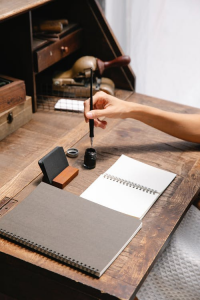The third Sapere Books’ Writers’ Retreat took place at The Priest House Hotel, Castle Donington between the 28th and 31st of October this year.
Adele Jordan, author of the Kit Scarlett Tudor Mysteries and the Shadow Cutpurses Tudor Thriller Series, helped to organise a full programme over the four days.
In Adele’s words:
“For a lot of writers, it’s a solitary world. Whether you are struggling to complete your manuscript or are in love with your story and find it hard to step away, it can’t be denied that for many writers a lot of time is spent in a staring contest with your computer screen, and sometimes we need to step away from that screen.
“For the last three years, a group of authors from Sapere Books have come together to create their own writing retreat, and this year saw our biggest yet. Fourteen authors, who write across various historical genres, came together to talk about all things writing.

Photo of The Priest House Hotel by Andy Stephenson, used under the Creative Commons Licence
“From romance to crime, we plundered the depths — from the importance of accuracy in military fiction, to how we plan and approach clue-filled detective stories. What transpired was not only a shared enthusiasm for our craft, but the reassurance we sometimes need that we are not alone — that there are others out there with the same passion who are keen to inspire and be inspired themselves.
“This year, we had some special sessions led by writers in the group. Highlights included an insightful look into the editing process by Neil Denby, author of the Quintus Roman Thrillers Series, and a debate on the accurate use of poisons in fiction and the importance of research by Linda Stratmann, author of The Early Casebook of Sherlock Holmes Series.

Adele Jordan
“Amy Durant, Sapere Books’ Publishing Director, led a popular Q&A session with authors attending the retreat. We also covered what makes a good title, how to grab your reader’s attention from the very first line, the complications around weaving a narrative with more than one viewpoint, and a friendly critique session where people were invited to bring their own work for discussion.
“Following inspiring chats, some political debates, good food and a very comfortable bar, I was delighted to see so many of the writers come away with big smiles on their faces. Thank you to everyone who came this year and to Amy Durant too for sparing the time to talk to us. Here’s hoping next year’s Writers’ Retreat is not only just as good, but the biggest and best yet!”
Some comments from the attendees:
Ros Rendle, author of The Strong Family Historical Saga and the Moondreams House Romances: ‘Thanks to all attendees at the authors’ retreat week for making it so useful and fun. Particular thanks to Adele Jordan for all the organising, the excellent programme and for keeping us on track with such diplomacy.’
Michael Fowler, author of the DS Hunter Kerr Investigations and Dr Hamlet Mottrell Investigations: ‘[The retreat] has turned the plot of my next book completely around. And it was nice to catch up with colleagues from previous retreats, as well as meet up with new ones.’
Linda Stratmann, author of The Early Casebook of Sherlock Holmes Series: ‘The sessions really stimulated the little grey cells of the brain, and I got some insights which had me rushing off to do some writing!’
C V Chauhan, author of the Inspector Sharma Thrillers Series: ‘It was a fantastic four days! Thanks everyone and a big thank you to Adele for leading and managing the four days so well.’
When was the last time you sat down to just clear your head? While not all mental strain you might be under can be cured by writing, it’s one tool that can help in a big way. Research continues to show that you can — with a keyboard, typewriter, or pen — write down what is bothering you and explore it in unique and healthy ways.
Being More Mindful
Cambridge University Press conducted a study not long ago focusing on how writing and mental health went hand-in-hand. The study focused on individuals who spent around 20 minutes daily just writing. The writing was expressive, capturing how they were feeling in the moment.
The research found that those who were open and honest with their writing were in a better mental state. They were more mindful of how they felt and saw the benefits that went along with it.
Reduction in Anxiety
 Anxiety impacts over 40 million adults in the United States. Only about one-third of all cases get proper treatment. Anxiety is different than just being nervous; it is the body’s response to a stressful event. Triggers can vary wildly. Being still can cause anxiety, as can having too many things going on at once. With anxiety, you are always looking for a way to battle back.
Anxiety impacts over 40 million adults in the United States. Only about one-third of all cases get proper treatment. Anxiety is different than just being nervous; it is the body’s response to a stressful event. Triggers can vary wildly. Being still can cause anxiety, as can having too many things going on at once. With anxiety, you are always looking for a way to battle back.
When you write, you can concentrate on just one thing. You can focus on what is in front of you and free your mind from everything bothering you. All the noise that is crowding your mind goes away. The more you write, the more you can concentrate and fight back the negative impact of anxiety.
Journaling as a Way to Battle Depression
Depression is another problem that writing can assist with, since it allows you to explore your thoughts and feelings.
You can sometimes get yourself out of mental holes by writing about future goals, current struggles, and giving yourself positive self-talk. When you can build yourself up through your writing, you can better set yourself up for future peace of mind and success.
Feel Better About Yourself and Where You Are Going
You may want to feel better about yourself, as well as where you’re heading in life. When you write, you can creatively accomplish all of that and more. What do you want your life to be like? Where do you ideally want to live? Do you have travel aspirations? How are you feeling about your current social relationships or your career?
When you write, you begin to realize exactly what’s on your mind. Your brain produced the words in front of you for a reason, and they can bring peace and direction for the road ahead.
How to Begin Your Writing Journey
Where do you begin when it comes to starting your writing journey? You can simply take pen and paper (or open up your laptop) and begin to write. But you can also take some steps to help your process along.
Create a Dedicated Writing Space
A solid first step is to find a dedicated spot where you can focus on your writing. Maybe it’ll be at a desk in your bedroom, or you can set aside a small writing nook. Also, how do you want to write? On your computer or laptop? In a journal? If you’re putting pen to paper, purchase a specific journal or notebook where your writing will go.
Make Sure You Write Every Day
Spend at least 15 to 20 minutes each day doing your writing. Resist judgment when you do this, letting your mind go wherever it wants to take you. There is no right or wrong way to write. As long as you dedicate the time to do so, you should be in good shape for the road ahead. When you can make writing a habit, it becomes a daily healing practice.
The mental health benefits of writing are well documented. You can reap a lot of benefits just by seeing what comes out of your head. Write a story, jot down words in a journal, and maybe even draw a picture. Examine your mental state or face your struggles by getting them out, rather than trying to bottle them up. Writing through your mental health struggles can be a valuable step towards improving your wellbeing.
Sources
cambridge.org – Emotional and physical health benefits of expressive writing
ADAA.org – Anxiety Facts and Statistics
RTOR.org – anxiety
StandOutBooks.com – Why You Need A Dedicated Writing Space And How To Find It
Sunshinebehavioralhealth.com – Recovery in a Quiet and Welcoming Environment
Image Credits:
Heidi Bitsoli is an editor at Sunshine Behavioral Health, a rehabilitation centre.

